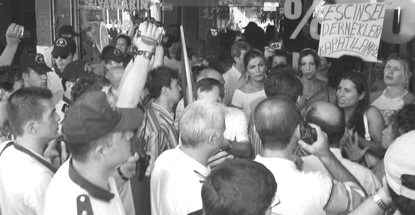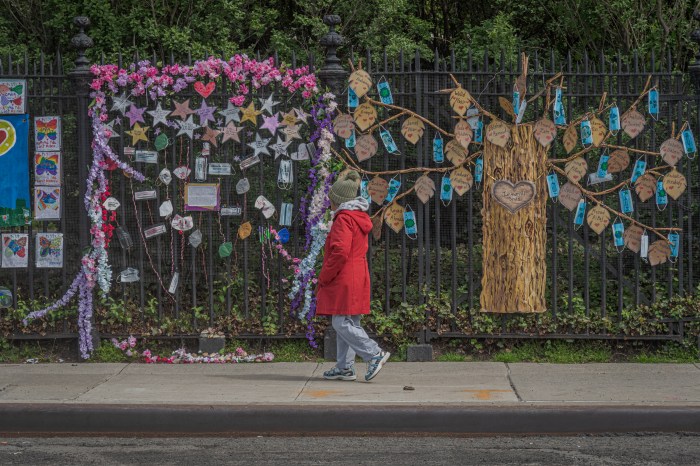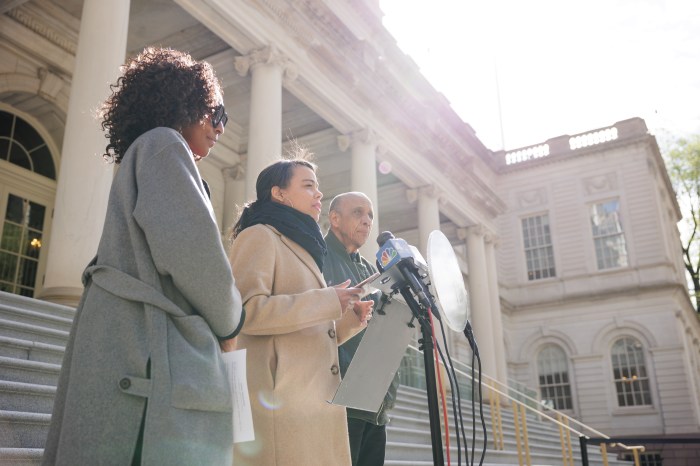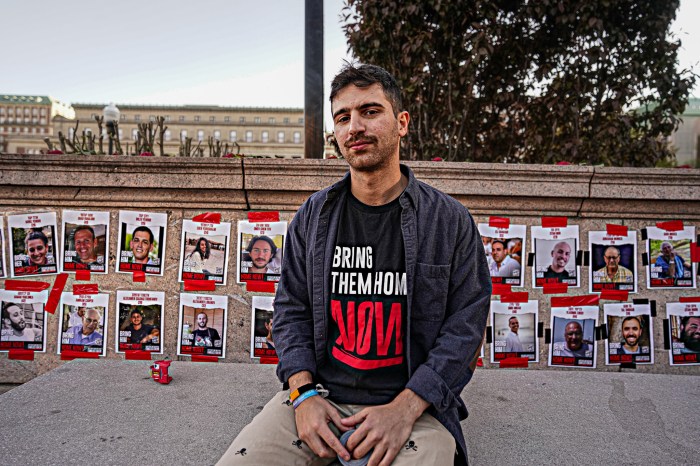Gay magazine seized, anti-gay thugs besiege Bursa LGBT center
This past week has seen Turkish gays the target of multiple attacks, by both the government and an organized homophobic mob.
Last Friday, the entire press run of Turkey’s only gay and lesbian magazine, published by the Ankara-based gay organization Kaos GL, was confiscated by police before it could be distributed to bookstores and kiosks. The 28th issue of the quarterly magazine, which bears the same name as the association that sponsors it and has been continuously published since 1994, was seized on a court order sought by the national government’s prosecutor in Ankara, Turkey’s capital, under a law for “protection of general morality.”
The national government of the Republic of Turkey has been controlled by an Islamist party, the AKP (Justice and Development Party), since 2002, and so are a significant majority of local governments.
Gokkusagi (The Rainbow Association) of Bursa, Turkey’s third-largest city with a population of 2 million, had called a demonstration for Sunday, August 6, to protest an attempt by the governor of Bursa to shut down the association under the same “general morality” statute. But before the LGBT group could hold its march, the association’s headquarters, where the gay protesters had assembled—and which also serves as an LGBT cultural center—was besieged by a stone-throwing, homophobic mob of 500, trapping some 100 gays, lesbians, and transgenders inside as the anti-gay hooligans chanted, “There is no way out here, you will die!”
The anti-gay demonstration was organized by the city’s Association of Tradesmen Supporting Bursaspor, the local football team, with the help of its Web site.
In a press conference held by the football supporters to call their anti-gay demonstration, the Tradesmen’s Association’s president, Fevzinur Dundar, declared: “Bursa is the city of Ottoman sultans and religious men. This city does not deserve to be humiliated by these people who are outside society. We will stop them from marching. If the governors and politicians do not want these people to be lynched, they must make their attitude clear.”
In response to this call for violence, members of gay groups from other cities—including Lambda-Istanbul and Ankara’s Kaos GL—journeyed to Bursa to join the planned gay march.
Even though the gay group had obtained a legal permit for its march in Bursa, organizers accused police of failing to insure the march could take place and to prevent violence.
“The police could have taken the required measures, but they didn’t. They even sought to dissuade us from holding the event,” Emir Birant, an activist from Ankara’s Kaos GL, told Agence France-Presse by telephone from Bursa. “There was absolutely no help from the authorities, which clearly demonstrates how homosexuals are regarded in Turkey.”
Transgendered individuals were particularly prominent in the Bursa gay protest.
“The president of the Bursa Rainbow Association is transgendered, and so are about half its members,” Cihan Huroglu of Lambda-Istanbul told Gay City News. “For the event, many transgenders from Ankara from the association Pink Life had arrived. Also around five trans-people from Istanbul had come. Altogether there were around 25 transgendered people among the 100 trapped in the Rainbow Center” during the homophobes’ siege, according to Huroglu.
Pink Life was founded in Ankara on June 30 as Turkey’s first association of transvestites and transsexuals.
After the siege ended, “The activists from Istanbul and Ankara eventually were deported with police escorts to the bus station, and safely returned home. But those who lived in Bursa had to wait a little longer until the football game started before they could leave safely,” Huroglu told Gay City News. “The police claimed that they would not be able to protect the LGBT activists, and said if they tried to march they would be taken into custody. Stones were thrown into the center’s windows, and also at the buses when the LGBT activists were trying to leave.”
“The Bursa group—whose full legal name is the Rainbow Association for Protecting Transvestites, Transsexuals, Gays and Lesbians, Solidarity, and Development of Cultural Activities—is an LGBT group that was formed in March this year, and has about 170 members,” Huroglu explained. “Their cultural center houses their regular meetings and gives social support to the gay community. Their most significant activity to date was their campaign against the executions of gay people in Iran—last month they collected petition signatures on the street, which was the first open political appearance of an LGBT group in Bursa.”
Government authorities, at the end of July, began legal proceedings to shut down the Bursa Rainbow Association not only under the “general morality” provisions in the Turkish Civil Code used to ban Kaos GL Magazine, but by citing constitutional clauses relating to “protection of the family.”
A similar procedure was used to try to outlaw the Kaos GL association last September—but after worldwide protests, especially in Europe, the government dropped the effort a month later. However, as Huroglu pointed out, “That was at the time of the fragile first-stage negotiations for Turkey’s accession to the European Union,” which requires full human rights for gays and lesbians of its member states. Now Turkey’s attempt to join the E.U. has somewhat stalled, and, said Huroglu, “the atmosphere in Turkey today is a bit less pro-E.U., and there is no provisional political threshold from the E.U. as there was last fall to encourage the government to show an extra effort” to conform to E.U. human rights norms.
The issue of Kaos GL Magazine that gave authorities the excuse to seize it last week included a special section entitled “Vision of Sexuality, Sexuality of Vision: Pornography,” with contributions by writers, academics, feminists, painters, and photographers discussing “cultural and artistic criticism of pornography via gay-lesbian sexuality,” according to a statement by Kaos GL’s editors, who insisted the magazine was “criticizing and questioning pornography.” Yet the government obtained a court order banning the magazine as “pornographic.”
Umut Guner, one of the founders of the Kaos GL association and a chief editor of its magazine, told Gay City News, “There is still massive discrimination against LGBT people in both the public and private sector. It is very difficult for someone to press charges when he or she faces discrimination based on sexual orientation; Turkish laws do not recognize crimes of discrimination based on sexual orientation or gender identity. Transgenders, who are often the most visible part of the LGBT community, continue to face discrimination and physical harassment by society. Just like gays and lesbians, they have little legal recourse. Homosexuality has never been illegal in modern Turkey, but the government has refused to ban discrimination based on sexual orientation or sexual identity.”
The only political party to have embraced lesbian and gay issues is the tiny, libertarian/socialist ODP (Freedom and Solidarity Party), which in 1997 even nominated a transgendered candidate, Demet Demir, for an Istanbul City Council seat. But in the last national elections, the ODP got only 0.3 percent of the vote.
In fact, said Guner, “It is difficult in Turkey for a political figure to embrace the idea of banning discrimination against gay people, because homosexuality is still seen as a taboo. However, this taboo is slowly changing. Some left-wing politicians have expressed sympathy for gay people‘s rights—but no right-wing politician has.”
Guner added, “Turkey has changed a lot in the last ten years. For instance, a demonstration, with rainbow banners flying, would have been unimaginable a decade before,” but this year, Istanbul held a ten-day Gay Pride Festival, including a July 1 Pride March that had 150 participants.
By way of comparison, Guner noted that, “In 1993, a group of mainly German gay and lesbian activists planned a three-day seminar in Istanbul on ‘Sexual Freedom Activities,’ meant to give support to a nascent and nervous Turkish LGBT movement. It had workshops on homosexuality and politics, and speeches by German politicians and foreign social scientists and artists. Istanbul authorities closed the event down. Twenty-eight foreign guests were arrested and deported.
Bars friendly to gay and lesbian people in Istanbul were raided; one of the Turkish organizers of the seminar was jailed. Now such repression would be impossible.”
Guner agreed that Turkey’s ambitions to join the European Union are playing a key role in changing the atmosphere for gay people.
“Turkey hopes to join Europe, not shut the door,” Guner said, adding: “All LGBT organizations, including Kaos GL, have been hampered by legal difficulties and occasional harassment. Yet we benefit from an environment in which censorship is relaxing, civil society is enjoying greater, if imperfect, space. The consequent sense of freedom is palpable in Turkish culture at large, and gays and lesbians feel it as well; so too do some in Turkey’s large communities of transgendered people.”
In view of the recent debate here over Iran, in which some gay activists in the U.S. have insisted that talking about “gay identity” is a form of cultural imperialism and insensitivity when applied to Arabic and Islamic cultures, Guner was asked his views on the question. He replied, “In my personal opinion, a ‘gay’ identity is not incompatible with Eastern, Arab, and Islamic cultures, which also means that ‘democracy, human rights, freedom’ are not incompatible with Eastern, Arab, and Islamic cultures. I believe Turkey has a chance to become the first predominantly Muslim country which will embrace all those Western values, including respect to individuals who are different because of their sexual orientation or sexual identity.”
Guner added, “There are reasons to be optimistic regarding the fate of Turkish LGBT people. Turkey has always been somewhere between the West and the East. Its culture includes both Western and Eastern values. These values sometimes clash with each other. We believe that a striking example of this clash is the struggle for human rights by Turkish lesbians, gays, bisexuals, and transgenders. Providing solutions to the problems of the Turkish LGBT community will be one of the litmus tests for the future of democracy in Turkey, as well as for its inclusion in the European Union. Even though the LGBT movement in Turkey is still in its early stages, one can easily notice that the Turkish LGBT movement is becoming more vocal and active. Especially since the 1990s, the momentum has been steadily increasing.”
Guner’s organizational ambitions match his optimism, and he said that, “Kaos is considering new projects, such as a publishing house, a psychological counseling center, a law bureau for gay rights, a solidarity network with homosexuals in jail, a health center, a senior citizens facility, and a radio channel.”
But even if one wants to give one’s troops hope to keep them in the fight, the past week’s events show that Turkey’s lesbians and gays still have some serious roadblocks in their way as they struggle to clear a path for change.
Doug Ireland can be reached through his blog, DIRELAND, at http://direland.typepad.com/direland/.
gaycitynews.com


































